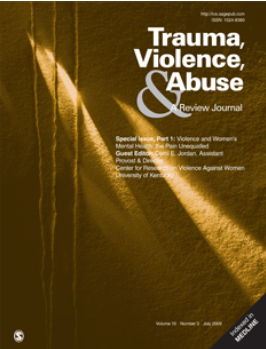Adolescents’ Experiences of Parental Intimate Partner Violence: A Review of Qualitative Literature
IF 5.4
1区 社会学
Q1 CRIMINOLOGY & PENOLOGY
引用次数: 0
Abstract
There is a growing body of qualitative research documenting the experiences of children growing up in the context of parental intimate partner violence (PIPV). Adolescents form an especially vulnerable group; yet there persists a systematic marginalization of their PIPV experiences in child maltreatment and violence exposure research. Qualitative research on adolescent PIPV perspectives can potentially amplify their voices and emphasize their unmet support needs and their developmentally unique strengths in achieving resilient outcomes. This can further inform adolescent- and youth-specific community and clinical intervention development and larger policy reform. This qualitative literature review includes 33 studies identified through an online research database search. Qualitative or mixed methods primary research studies that sampled adolescent participants aged from 13 to 19 years, published in English in peer-reviewed journals, and objectivizing any aspect of adolescent PIPV experience were included. Quality was assessed using the Critical Appraisal Skills Program checklist. Findings across studies were synthesized into eight overarching themes: Stifled Freedom and Autonomy; The Parentified Protector; Coping through Mental Escape, Creative Expression, and Cultural Identity; Older, Stronger, and Smarter during PIPV; Polyvictimization; Gender, Violence Acceptability and Dating Violence; and Felt Support Needs. This review sets the agenda for further qualitative, adolescent-first inquiry into the experiences of adolescents growing up with interparental violence, especially in low- to middle-income countries where intimate partner and spousal violence along with children and adolescents’ experience of it are doubly prevalent compared to the developed world.青少年遭受父母亲密伴侣暴力的经历:定性文献综述
越来越多的定性研究记录了在父母亲密伴侣暴力(PIPV)背景下长大的儿童的经历。青少年是一个特别脆弱的群体;然而,在儿童虐待和暴力暴露研究中,他们的PIPV经历仍然被系统地边缘化。对青少年PIPV观点进行定性研究可能会放大他们的声音,并强调他们未得到满足的支持需求和他们在实现弹性结果方面的独特发展优势。这可以进一步为青少年和青年特定的社区和临床干预发展以及更大的政策改革提供信息。本定性文献综述包括通过在线研究数据库检索确定的33项研究。定性或混合方法纳入了以13至19岁青少年为样本,在同行评议期刊上以英文发表的、客观化青少年PIPV经历的任何方面的初步研究。使用关键评估技能程序检查表评估质量。所有研究的结果被综合为八个总体主题:窒息的自由和自治;化了双亲的保护人;心理逃避、创造性表达和文化认同的应对PIPV期间更老、更强、更聪明;Polyvictimization;性别、暴力可接受性和约会暴力感受支持需求。本综述为进一步对青少年在父母间暴力中成长的经历进行定性、青少年优先的调查设定了议程,特别是在低收入和中等收入国家,在这些国家,亲密伴侣和配偶暴力以及儿童和青少年的暴力经历比发达国家更为普遍。
本文章由计算机程序翻译,如有差异,请以英文原文为准。
求助全文
约1分钟内获得全文
求助全文
来源期刊

Trauma Violence & Abuse
Multiple-
CiteScore
13.60
自引率
7.80%
发文量
131
期刊介绍:
Trauma, Violence, & Abuse is devoted to organizing, synthesizing, and expanding knowledge on all force of trauma, abuse, and violence. This peer-reviewed journal is practitioner oriented and will publish only reviews of research, conceptual or theoretical articles, and law review articles. Trauma, Violence, & Abuse is dedicated to professionals and advanced students in clinical training who work with any form of trauma, abuse, and violence. It is intended to compile knowledge that clearly affects practice, policy, and research.
 求助内容:
求助内容: 应助结果提醒方式:
应助结果提醒方式:


